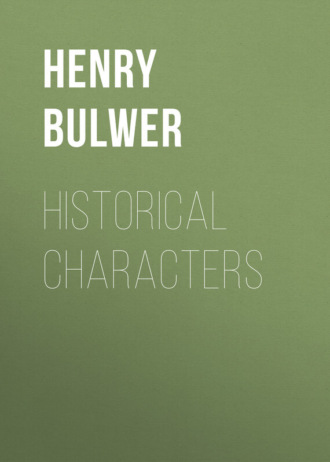 полная версия
полная версияHistorical Characters
110
His son, the late Earl Canning, represented Warwick in the House of Commons from August, 1836, to March, 1837.
111
See Microcosm.
112
In the Life given in the edition of Mr. Canning’s Speeches.
113
Speech on the King’s Message relative to Union with Ireland, January 2, 1799.
114
Speech on the Army Estimates, Dec. 8, 1802.
115
A virtual declaration of hostility against every neutral power.
116
This is one of the portions from my original sketch, which it would appear that Mr. Bell consulted and copied. See Appendix.
117
Speech on Regency Question, Dec. 31, 1810.
118
Speech on vote of thanks to the Marquis of Wellington, July 7, 1813.
119
See Appendix.
120
Spence preached about the period of the French Revolution, and his doctrines were revived now by his follower, Evans.
121
The accuracy of this story having been disputed, I asked Lady Palmerston, who was living in the same set as the lady in question, and also about this period residing at Brighton, whether she remembered hearing anything corroborating my information, and she said she perfectly well remembered hearing the anecdote I have narrated. But there is nothing in the Duke of Wellington’s letters to confirm it, and, like most tales of a similar nature, it probably had some foundation, but was not precisely correct either in details or dates.
The main fact, however, remains untouched, and is indeed proved by the Wellington correspondence, viz., that Lord Liverpool applied to the Duke of Wellington to obtain the King’s consent to Mr. Canning’s appointment, and that the Duke succeeded, though not without difficulty.
122
This story was related by Sir Roundell Palmer in his address to the jury in the trial of Ryves v. the Attorney-General. I do not know whence Sir Roundell derived the anecdote, but I think it as well to say, in favour of its authenticity, that I heard it thirty years ago from a person who was present on the occasion, and that it has been recorded for twenty-six years in my MS.
123
The correctness of this story has been questioned by a correspondent to the Times, who signs “A. W. C.” I heard it from a person much in the intimacy of George IV. and Mr. Canning, and noted it when I heard it as curious; but I give it as gossip, which, whether true or false, illustrates the notions of the time, and is not incompatible with what is said by “A. W. C.” himself.
124
Lord Townsend being dismissed in 1717 from the Lord Lieutenancy of Ireland, at the instigation of Lord Sunderland, the whole of Lord Townsend’s party in the Cabinet at that time, including Walpole, resigned. They were attacked in much the same way as the Duke of Wellington was attacked in 1827, and thought it necessary to defend themselves in the same manner, though there is no doubt that they did resign expressly for the purpose of ousting a government which they thought could not go on without them. In the end they succeeded. – See Coxe’s “Memoirs of Sir Robert Walpole,” page 107.
125
In the Memoirs of Sir J. Mackintosh, in the “Keepsake.” 1829.
126
Lord Nugent was a remarkably large heavy man, with a head even larger than was required to be in proportion to his body.
127
“Annual Register,” 1821.
128
Sir J. Mackintosh, in speaking of Mr. Canning’s despatches on the South American question, said that “they contained a body of liberal maxims of policy, and just principles of public law, expressed with a precision, a circumspection, a dignity, which will always render them models and masterpieces of diplomatic composition.” – June 15, 1826.
129
Protestant here is, of course, meant to signify anti-Catholic.
130
Letter to the Duke of Wellington, August 11, 1828.
131
Mr. Peel’s Memorandum for the Duke of Wellington, August 25, 1828.
132
Cécrops, Cadmus et Danäus.
133
Didon.
134
Enée.
135
Syracuse.
136
Milet, Ephèse.
137
Grand nombre de petites colonies dans le pays latin; aucune ne devint célèbre.
138
Invasion des Huns, Goths, Vandales, Cimbres, etc.
139
Croisades.
140
Dans un temps de factions politiques cela cesserait d’être exact; car alors chaque secte voudrait nécessairement être l’auxiliaire de tel ou tel parti, comme on l’a déjà vu; mais ces factions une fois calmées la religion deviendrait à l’instant dans les Etats-Unis ce qu’elle y est aujourd’hui; ce qui veut dire en résultat, qu’elle n’y a point de fanatisme pour son propre compte, et c’est déjà beaucoup. – (Note du citoyen Talleyrand, au mois de ventôse, an VII.)
141
Cela était littéralement vrai lorsque ce mémoire a été lu à l’institut. Si depuis ce moment des partis s’y sont formés de nouveau, s’il en est un qui travaille à remettre honteusement l’Amérique sous le joug de la Grande-Bretagne, cela confirmerait beaucoup trop ce que j’établis dans le cours de ce mémoire, que les Américains sont encore Anglais; mais tout porte à croire qu’un tel parti ne triomphera pas, que la sagesse du gouvernement français aura déconcerté ses espérances; et je n’aurai pas à rétracter le bien que je dis ici d’un peuple de qui je me plais à reconnaître qu’il n’est Anglais que par des habitudes qui ne touchent point à son indépendance politique, et non par le sentiment qui lui ferait regretter de l’avoir conquise. – (Note du citoyen Talleyrand, au mois de ventôse, an VII.)

